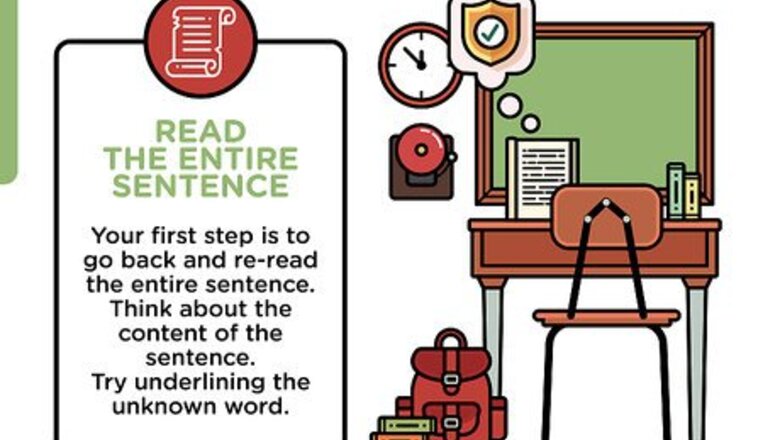
views
Using Context to Define the Word
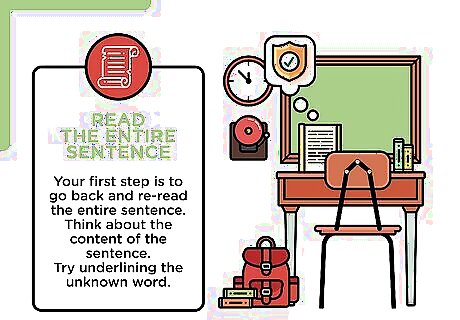
Read the entire sentence. It can be very frustrating to have your reading interrupted by an unknown word. If you are in the middle of an exam or an assignment for school or work, it can also be very stressful. If you can't reach for a dictionary, take other steps to figure out what the word means. Your first step is to go back and re-read the entire sentence. You probably lost track of what your were reading when you stumbled upon the new word. Think about the content of the sentence. Do you understand the sentence without using the new word? Or is it incomprehensible? Try underlining the unknown word. This will help you separate it from the rest of the sentence.
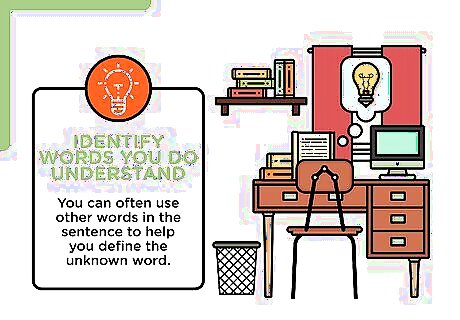
Identify words you do understand. You can often use other words in the sentence to help you define the unknown word. Think about what else is happening in the sentence. Hopefully, this will help you figure out whether the unknown word is a noun, verb, or adjective. For example, maybe you are looking at a sentence that says, "It was a very sultry day in the middle of the summer." You probably understand each word except for "sultry". Think about what you know about the summer. It is likely that "sultry" has something to do with weather. Maybe your biology exam has this sentence, "Many members of the canine family are predators, looking for other animals to eat." You can surmise that "predators" prey on other animals.
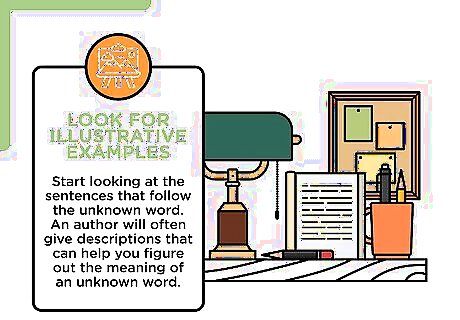
Look for illustrative examples. Once you have examined the other words in that sentence, you can move on. Start looking at the sentences that follow the unknown word. An author will often give descriptions that can help you figure out the meaning of an unknown word. For example, take the sentence, "It was a very sultry day in the middle of summer." It could be followed by the sentence, "The heat and humidity made it appealing to sit in the shade and drink lemonade." You can now more confidently define "sultry". The descriptive words such as "heat" and "humidity" are further clues that it is a description of the weather. Sometimes, the descriptive examples will be right in the original sentence. For example, it could say, "Sultry days are so damp and hot."
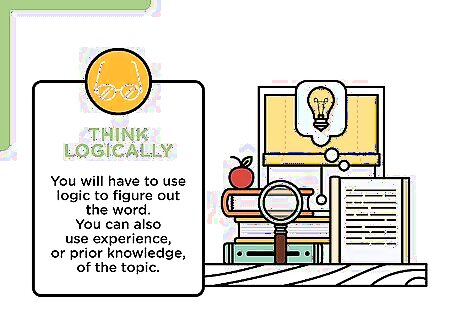
Think logically. Sometimes, the context clues will not be as clear. You will have to use logic to figure out the word. You can also use experience, or prior knowledge, of the topic. For example, maybe a sentence says, "In the antebellum South, many plantation owners kept slaves." It is likely that "antebellum" is the unknown word. The sentence itself does not offer many clues. However, the following sentences are, "But after the Civil War, slavery was outlawed. This was a major change between the two periods." Think about what you know now. You are reading information about two different time periods, right? Before the Civil War and after the Civil War. You can now make a pretty logical assumption about the word "antebellum". Based on your experience and reading the following sentences, you know it probably means "before the war".
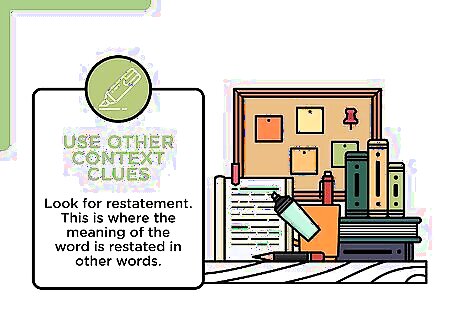
Use other context clues. Sometimes an author will offer other types of clues. Look for restatement. This is where the meaning of the word is restated in other words. Here is an example of "restatement": "The pig squealed in pain. The high-pitched cry was very loud." You can also look for "appositives". This is where an author highlights a specific word by placing a further description between two commas. This is an example of the use of an appositive: "The Taj Mahal, which is a massive white marble mausoleum, is one of the most famous landmarks in India. You may not know the words "Taj Mahal", but the use of appositives makes it clear that it is a landmark.
Understanding Basic Etymology
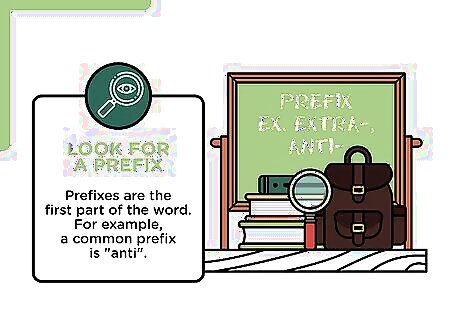
Look for a prefix. Etymology is the study of the meanings of words. It also looks at the origins of words, and how they have changed over time. By learning about etymology, you can find new ways to define unknown words without using a dictionary. Start by looking at each part of the word in question. It is very helpful to look to see if the word has a common prefix. Prefixes are the first part of the word. For example, a common prefix is "anti". "Anti" means "against". Knowing this should help you figure out the meanings of words such as "antibiotic" or "antithesis". "Extra" is a prefix that means "beyond". Use this to figure out words such as "extraterrestrial" or "extracurricular". Other common prefixes are "hyper", "intro", "macro" and "micro". You can also look for prefixes such as "multi", "neo" and "omni".
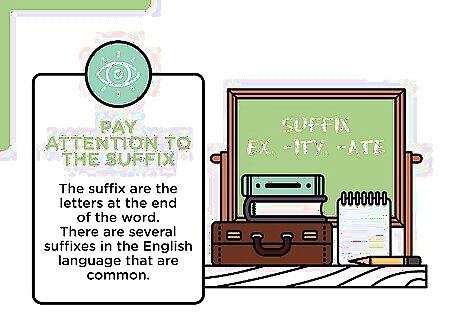
Pay attention to the suffix. The suffix are the letters at the end of the word. There are several suffixes in the English language that are common. They can help you figure out what kind of word you are looking at. Some suffixes indicate a noun. For example, "ee" at the end of the word almost always indicates a noun. Some examples are "trainee" and "employee". "-ity" is also a common suffix for a noun. Examples include "electricity" and "velocity". Other suffixes indicate verbs. For example, "-ate". This is used in words such as "create" and "deviate". "-ize" is another verb suffix. Think about the words "exercise" and "prioritize".
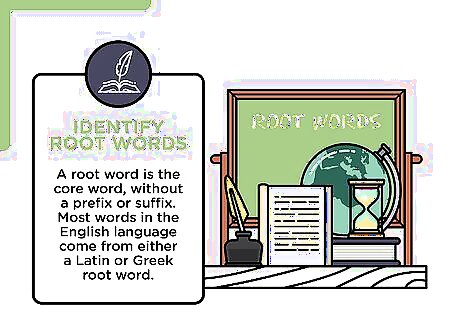
Identify root words. A root word is the core word, without a prefix or suffix. Most words in the English language come from either a Latin or Greek root word. By learning common root words, you can begin to identify new words more easily. You will also be able to recognize words that have had a prefix or suffix added. An example of a root word is "love". You can add many things to the word: "-ly" to make "lovely". "Bio" is a Greek root word. It means "life, or living matter". Think about how we have adapted this root word to become "biology", "biography", or "biodegradable". The root word mater- or matri- comes from the Latin word mater, meaning mother. By understanding this root, you can better understand the definitions of words like matron, maternity, matricide, matrimony, and matriarchal.
Building Your Vocabulary
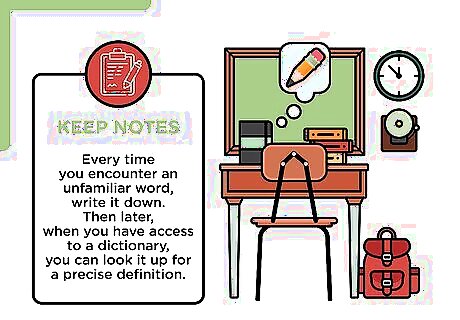
Keep notes. If you can increase the size of your vocabulary, you will find yourself less likely to encounter unknown words. There are several steps you can take to effectively build your vocabulary. For example, you can start by writing notes. Every time you encounter an unfamiliar word, write it down. Then later, when you have access to a dictionary, you can look it up for a precise definition. Keep a small pack of sticky notes with you while you read. You can write the unfamiliar word on a note and just stick it on the page to return to later. Start carrying a small notebook. You can use it to keep track of words that you don't know and new words that you have learned.
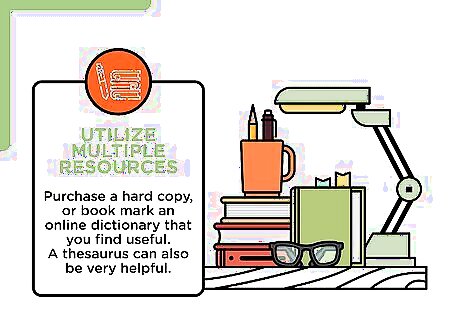
Utilize multiple resources. There are a lot of tools that you can use to help you build your vocabulary. The most obvious is a dictionary. Purchase a hard copy, or book mark an online dictionary that you find useful. A thesaurus can also be very helpful. It will give you synonyms for all of the new words you are learning. Try a word of the day calendar. These handle desk tools will give you a new word to learn each day. They are available online and at bookstores.
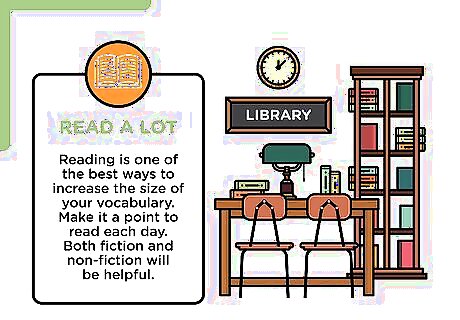
Read a lot. Reading is one of the best ways to increase the size of your vocabulary. Make it a point to read each day. Both fiction and non-fiction will be helpful. Novels can expose you to new words. For example, reading the latest legal thriller will likely expose you to some legal jargon you've never heard before. Read the newspaper. Some papers even have a daily feature that highlights language and explores the meanings of words. Make time to read each day. You could make it a point to scroll through the news while you drink your morning coffee, for example.
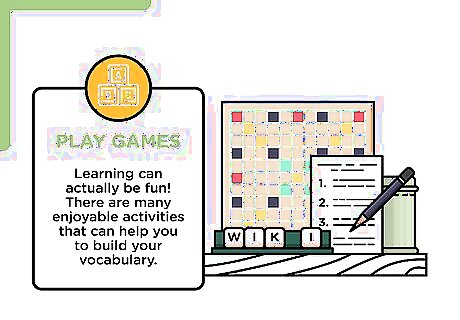
Play games. Learning can actually be fun! There are many enjoyable activities that can help you to build your vocabulary. Try doing crossword puzzles. Crossword puzzles are a great way to learn new words. They will also stretch your brain by giving you interesting clues to figure out the right word. Play Scrabble. You'll quickly learn that unusual words can often score the most points.















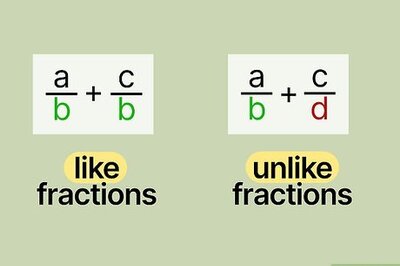




Comments
0 comment